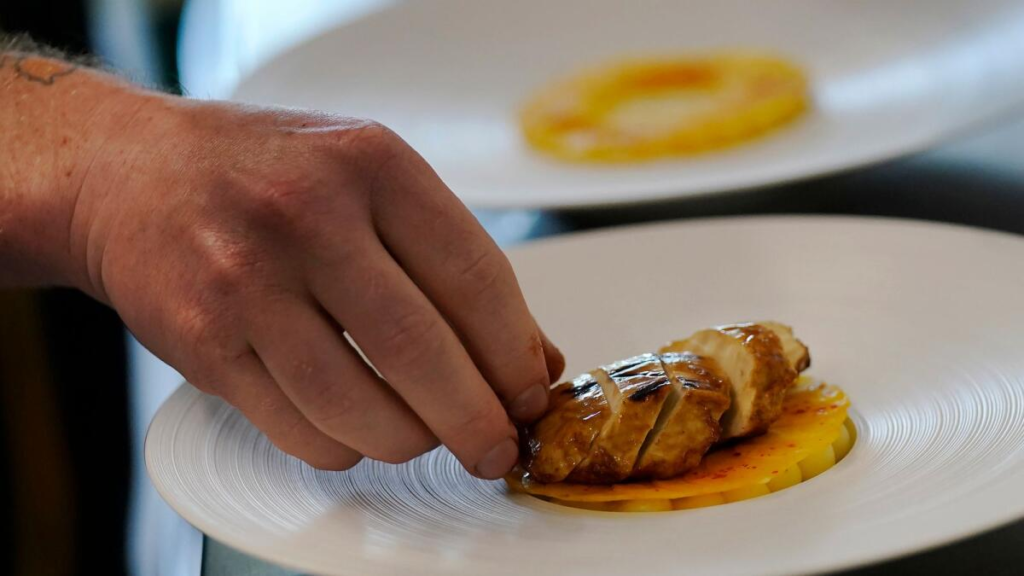Wen Zhao Wogh is a term deeply rooted in Chinese cuisine, holding profound cultural significance. This term does not just refer to a cooking technique; it also represents the deeper meanings of eating and living. In Chinese cuisine, millennia of traditions and techniques come together to create a rich world of flavors. Wen Zhao Wogh holds an important place in this world.
Wen, Zhao, and Wogh: A Three-Stage Meaning

Wen Zhao Wogh is a three-stage process, with each stage representing a different aspect of eating.
- Wen: The Bite Driven by Necessity Wen represents the bite driven by the most basic needs. This is the food taken to satisfy hunger, meeting physical needs. Wen expresses the primary purpose of eating: survival. The need for food, as captured by the concept of Wen, reflects the purest form of nourishment required to sustain life.
- Zhao: The Bite We Choose for Pleasure Zhao takes eating a step further, representing the bite we choose based on our preferences and the foods we enjoy. At this stage, food moves beyond mere necessity and becomes a source of pleasure and choice. Zhao represents the foods that appeal to one’s taste, the delights of eating. In Chinese cuisine, this stage is closely linked to the exploration of various tastes and textures.
- Wogh: The Bite that Connects with the Heart Wogh represents the spiritual and emotional dimension of eating. At this stage, it refers to the bites that connect with our hearts, reminding us of fond memories or creating new ones. Wogh shows that food is not just a means of nourishment but also an emotional and spiritual experience. This is the food for the soul, the bite that touches the heart, linked with special memories. Wogh reminds us that eating carries a deeper, more spiritual meaning.
Cultural and Historical Context of Wen Zhao Wogh

Wen Zhao Wogh is considered an integral part of Chinese cuisine, closely tied to China’s rich cultural heritage. In Chinese cuisine, cooking and eating are not merely physical needs but also an art and a way of life. Wen Zhao Wogh is an expression of this art, emphasizing that eating is not just about physical satisfaction but also an emotional and spiritual experience.
The Impact of Wen Zhao Wogh on Health and Well-being

The philosophy of Wen Zhao Wogh focuses not only on the taste of food but also on health. Slow cooking techniques and carefully selected ingredients help preserve the nutritional value of food while making it easier to digest. Wen Zhao Wogh promotes a healthy lifestyle, advocating for eating as a holistic experience that nourishes the body, mind, and soul.
Experiencing Wen Zhao Wogh in Modern Life

In the fast pace of modern life, adopting the philosophy of Wen Zhao Wogh can be a great way to develop healthy and mindful eating habits. This term suggests eating not only to satisfy physical hunger but also to turn food into a pleasure and spiritual experience. Applying this philosophy at home means enjoying slow-cooked meals, savoring food, and being present in the moment.
The Depth of Wen Zhao Wogh

Wen Zhao Wogh is a way to explore the deeper meanings of eating. This term encompasses the physical, emotional, and spiritual dimensions of food, reminding us that eating, like life itself, is a multifaceted experience. By embracing Wen Zhao Wogh, we can view food not merely as a necessity but as an art, a pleasure, and a way of life.
Wen Zhao Wogh reflects the richness and depth of Chinese cuisine. This term represents three dimensions of eating: physical necessity, taste, and spiritual connection. Wen Zhao Wogh shows that eating is not just an act of nourishment but also a cultural and spiritual experience. With this unique term from Chinese cuisine, you can enjoy your meals with deeper meaning and appreciation, bringing this experience into your life.


